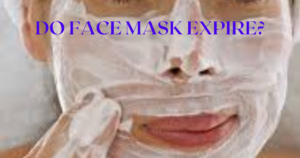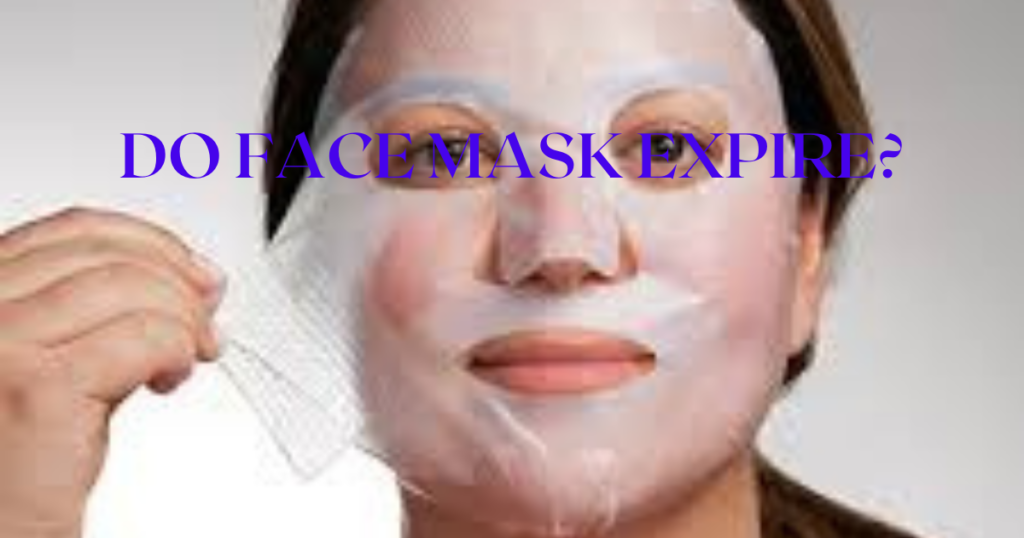Face masks have become an essential part of many skincare routines. They offer a targeted way to address various skin concerns, from hydration and brightening to deep cleansing and pore minimization. But with so many different types of face masks available, a common question arises: Do face masks expire?
The answer is yes, face masks, just like most other skincare products, can expire. While slapping on an expired mask might not cause immediate harm, it can significantly reduce the effectiveness of the product or even pose potential risks. This guide delves into the reasons why do face masks expire? explores how to identify expired masks, and offers tips for maximizing their shelf life.

Why Face Masks Expire: Understanding the Science Behind Efficacy Loss
Several factors contribute to the expiration of face masks, impacting their potency and safety:
-
Ingredient Degradation: Face masks often contain a blend of active ingredients that target specific skin concerns. These ingredients, especially those derived from natural or organic sources, can degrade over time. Factors like oxidation (exposure to air), evaporation, or simple breakdown can render them less effective.
-
Bacterial Contamination: Expired face masks pose a potential hygiene risk. Over time, particularly if exposed to air, moisture, or high temperatures, they can become breeding grounds for bacteria and fungi. Applying such a mask to your face can introduce these harmful microbes into your pores, potentially leading to irritation, breakouts, or even infections.
-
Change in Texture or Consistency: A telltale sign of an expired face mask is a noticeable change in its texture or consistency. The mask might become lumpy, dry, or runny, indicating that the product’s formula has broken down and is no longer stable or effective.
-
Reduced Efficacy: Using an expired face mask simply doesn’t make sense. The ingredients might not be potent enough to deliver the intended benefits, potentially leaving your skin feeling unchanged or even causing irritation due to the breakdown of the formula.
By understanding these factors, you can recognize the importance of using face masks within their recommended timeframe to ensure optimal safety and effectiveness.
How to Check for Expiry: Keeping Your Skincare Routine Safe
So, do face masks expire? Yes, and it’s crucial to know how to identify when a mask is past its prime. Here are some key ways to check for expiration:
-
Expiration Date: The most straightforward way to determine a face mask’s shelf life is to check the packaging. Look for an expiration date or a “best before” date. This date indicates the manufacturer’s guarantee of the product’s potency and safety until that specific time. If the date has passed, it’s best to discard the mask.
-
Symbols: Many face mask packages include symbols that provide additional information about shelf life. Look for the Period After Opening (PAO) symbol, which typically resembles a jar icon with a number followed by an “M” inside (e.g., “12M”). This symbol indicates the recommended timeframe for using the product after opening. For example, “12M” means the mask should be used within 12 months of opening the container.
-
Appearance and Smell: Your senses can also be helpful tools. If the mask has developed an unusual odor, changed color significantly, or has an altered texture that seems off, it’s likely expired and should be discarded.
-
Consistency: Expired face masks often exhibit changes in consistency. If the mask has separated or become clumpy, it’s a sign that the formula has broken down and is no longer effective.
By following these simple checks, you can ensure you’re only using safe and effective face masks in your skincare routine.
What to Do with Expired Face Masks: Disposing Responsibly and Maintaining Safety

Knowing do face masks expire? is essential, but what should you do with expired masks? Here’s how to handle them responsibly:
-
Dispose of Them Properly: Do not use expired face masks! Expired masks can be ineffective and potentially harmful. The best course of action is to discard them according to your local waste disposal guidelines.
-
Do Not Attempt to Revive: It’s tempting to try and salvage an expired face mask but resist the urge. Adding water or other ingredients to “revive” an expired mask can introduce contamination and pose a greater risk to your skin.
Remember, your skin is your largest organ, and it deserves the best care. Using expired face masks simply isn’t worth the potential risks.
Do Face Masks Expire? Maximizing Shelf Life with Storage Tips
While do face masks expire? Yes, but there are steps you can take to extend their shelf life and ensure you get the most out of your skincare products:
-
Store Properly: Heat, light, and moisture are the enemies of face masks. Keep your masks in a cool, dry place away from direct sunlight and heat sources like bathrooms or vanities with steaming showers. Consider storing them in a drawer or on a shelf in your bedroom or closet.
-
Seal Tightly: After each use, ensure the packaging is tightly sealed to prevent air and moisture from entering. This will help slow down the degradation of the ingredients and maintain the product’s efficacy.
-
Use Within the Recommended Timeframe: Once you’ve opened a face mask, especially those containing natural or organic ingredients, it’s crucial to use it within the specified timeframe. This timeframe is usually indicated by the PAO symbol or mentioned in the product information leaflet. Using the mask within this timeframe helps ensure you experience the full benefits and avoid potential issues associated with expiration.
-
Don’t Double-Dip: It might be tempting to reuse a sheet mask or apply leftover product from a jar mask to your face for a second time. However, this practice can introduce bacteria from your skin into the product, accelerating spoilage and increasing the risk of contamination. It’s best to use a single-use amount for each application.
-
Portion Control: If you frequently use clay or powder masks that come in larger quantities, consider dividing them into smaller portions for individual use. This can help minimize exposure to air and moisture, potentially extending the shelf life of the remaining product.
By following these storage and usage tips, you can get the most out of your face masks and ensure they remain effective and safe for your skin throughout their recommended shelf life.
Beyond Expiration: Recognizing Signs a Mask Might Not Be Right for You
While expiration is a crucial factor, it’s important to recognize that even a non-expired face mask might not be suitable for you. Here are some signs to watch out for:
-
Skin Irritation: If you experience any redness, burning, itching, or stinging after using a face mask, discontinue use immediately. This could indicate an allergic reaction to one of the ingredients or simply that the mask is too harsh for your skin type.
-
Breakouts: While some face masks, like those with clay or salicylic acid, can help reduce breakouts, others might clog pores or irritate your skin, leading to breakouts. If you notice an increase in blemishes after using a mask, discontinue use and consult a dermatologist to determine the best course of action for your skin.
-
Lack of Results: If you’ve used a mask consistently within the recommended timeframe and haven’t noticed any improvement in your skin concerns, it might not be the right product for you. Consider trying a different mask formulated for your specific needs.
Remember: When in doubt, always consult a dermatologist for personalized advice on incorporating face masks into your skincare routine.
Conclusion
Do face masks expire? Absolutely. Understanding the factors that contribute to expiration and knowing how to identify expired masks empowers you to make informed choices about the products you use on your skin. By following the tips outlined in this guide, you can ensure you’re using safe and effective face masks that deliver the intended benefits for a healthy, radiant complexion. Remember, proper storage, responsible disposal of expired products, and mindful usage practices are all essential for a safe and effective skincare routine that incorporates the power of face masks.

